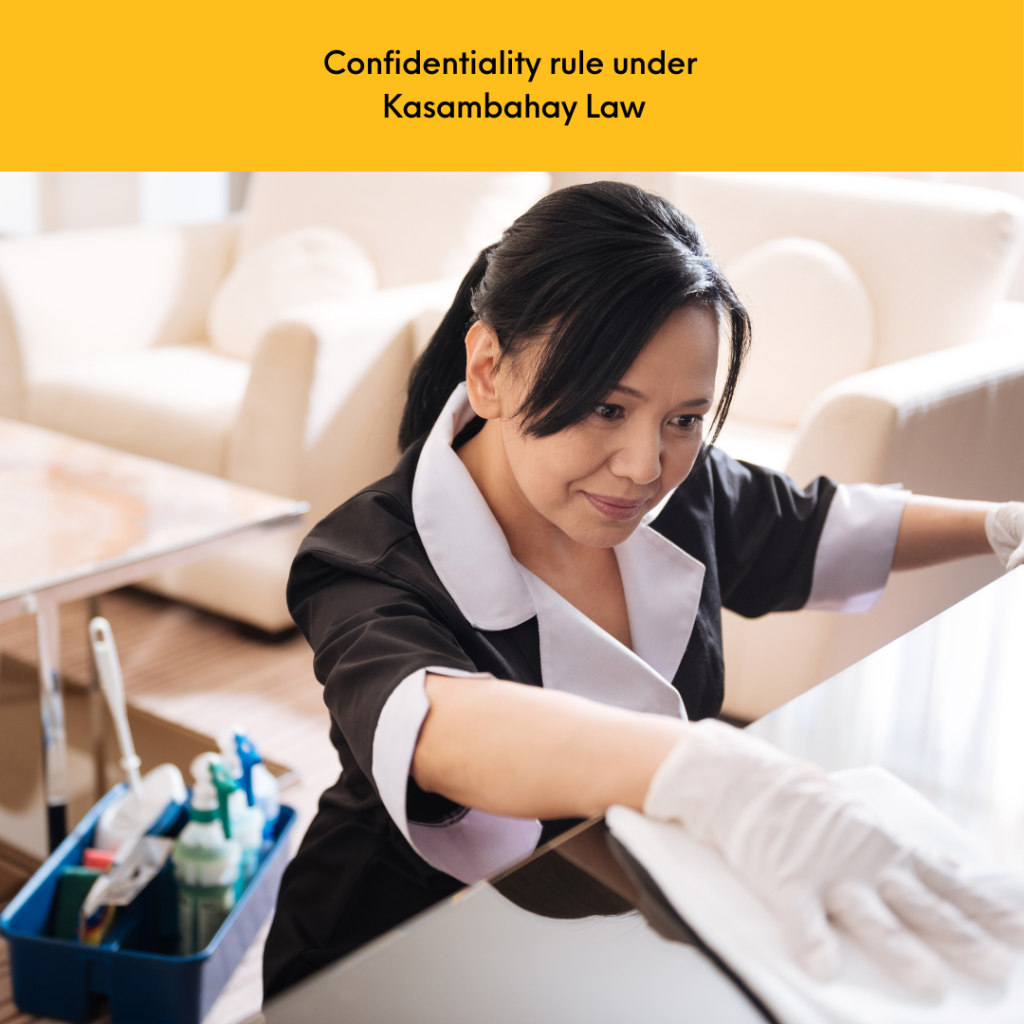
Published 12 January 2024, The Daily Tribune
Our country, known for its strong sense of community and family ties, holds kasambahays (househelp) in high regard. In recognition of their invaluable contribution to households, the government introduced the Kasambahay Law in 2013.
The law aims to promote the welfare and protect the rights of kasambahays, including provisions for the confidentiality of information they and their employer may gather within the scope of their employment. In this article, we will focus on the importance of the right to privacy and confidentiality rule embodied in the law and its implications for both employers and employees.
Republic Act 10361, or the Kasambahay Law, ensures the fair treatment and protection of domestic workers by setting the guidelines for hiring, working conditions, compensation, and termination of employment. Under Section 40 of the law, any violation of the provisions thereof declared unlawful shall be punishable with a fine of not less than P10,000, but not more than P40,000, without prejudice to the filing of appropriate civil or criminal action by the aggrieved party.
The Implementing Rules and Regulations of the law enumerated unlawful acts, to wit: 1. Employment of children below 15 years of age; 2. Withholding the wages of the kasambahay; 3. Interference in the disposal of wages of the kasambahay; 4. Requiring deposits for loss or damage; 5. Placing the kasambahay under debt bondage; and 6. Charging another household for temporarily performed tasks by the kasambahay.
As stated, one notable aspect of the Kasambahay Law is the confidentiality rule. The law recognizes both the employer’s and employee’s right to privacy. Section 7 provides that respect for the privacy of the domestic worker shall be guaranteed at all times and extend to all forms of communication and personal effects. This guarantee equally recognizes that the domestic worker is obliged to render satisfactory service at all times.
The Kasambahay Law equally protects the employer’s right to privacy. Section 10 of the law provides that all communication and information pertaining to the employer or members of the household shall be treated as privileged and confidential and shall not be publicly disclosed by the kasambahay during and after employment. Such privileged information shall be inadmissible in evidence, except when the suit involves the employer or any member of the household in a crime against persons, property, personal liberty and security, and chastity.
The confidentiality rule covers a wide range of information that may not be disclosed by the kasambahay during and after employment without the employer’s consent, such as but not limited to the following:
1. Personal and family matters, family finances, health conditions, and any other sensitive family details;
2. The employee’s daily routines, schedules, and specific directives are given by the employers. It may include information about household occupants, guests, and any other information related to the household’s operations;
3. Professional information, more so if the employer is a public figure, government official, or occupies a high position in society. These include respecting the professional reputation, avoiding unauthorized disclosure of work-related conversations, and maintaining secrecy about the employer’s professional dealings and work.
Confidentiality is the foundation of trust between employers and kasambahays. By ensuring the privacy of personal and professional matters, employers can trust that any information gathered by the kasambahay during their employment will not be disclosed without their consent.
Privacy breaches may expose employers to various security risks, financial fraud, or reputational damage. Strict observance and compliance by the kasambahay of the confidentiality rule provide employers with a sense of security and peace of mind. In the same vein, the employer’s respect for the kasambahay’s right to privacy creates a harmonious work environment, fosters open communication, and ensures that any sensitive information remains within the household’s trusted confines.
Recognizing the importance of confidentiality and the right to privacy under the law benefits households and contributes to stronger communities and a more dignified workforce for society as a whole.
For more of Dean Nilo Divina’s legal tidbits, please visit www.divinalaw.com. For comments and questions, please send an email to cabdo@divinalaw.com.

